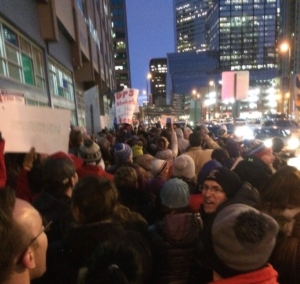
On Jan. 22, 93 percent of Denver teachers voted to strike, following 14 months of unsuccessful negotiations with Denver Public Schools. This will be their first strike in 25 years and comes on the heels of decades of underfunding, privatization and low wages in Denver schools.
In the span of a few years, Denver has become one the most expensive cities in the country. Average rents have increased by more than 50 percent since 2010. In the same time period, teacher wages have stagnated and in many cases declined in real dollars. This is due to a controversial compensation system called ProComp, which is central to the district’s neoliberal school reform agenda.
Following the strike vote, Denver Public Schools requested state intervention to block the strike. The state’s labor department now has 14 days to decide if it will take jurisdiction over the dispute, which at worst could mean a 180 day embargo on any work stoppage action. DPS has taken advantage of this delay to unleash an array of intimidation tactics, but Denver teachers, buoyed by the support of students and parents, remain unbowed.
A decade of false promises
The ProComp system at the heart of the dispute was approved by Denver voters in 2008 with the promise of millions of dollars in increased school funding. ProComp was billed as a pay-for-performance program of incentives and bonuses which would reward teachers for increased test scores and attract educators to the neediest schools. In practice, like many other school reform experiments in Denver, ProComp has led to teacher attrition, a widening achievement gap and community outrage.
Denver students and teachers have been the unwitting guinea pigs for a series of neoliberal school reform experiments championed by for-profit education corporations and bipartisan school privatizers.
Similar to other urban school districts like Los Angeles and New Orleans, Denver Public Schools has waged an all-out war on its neighborhood public schools and teachers union for the sake of profit. Denver’s traditional comprehensive community schools–with orchestras, football teams and career teachers–have largely been closed and replaced by charters and “innovation” schools. These schools are allowed to pick and choose which students they accept and do not necessarily have to accommodate disabled students or English learners. Instead of going to their neighborhood schools, Denver students are matched with schools across the city through an online lottery system. Unsurprisingly, Denver schools are notorious for under-serving poor students and students of color, with one of the worst achievement gaps in the country.
Denver’s school reform initiatives are not only ineffective, they’re also expensive. The outrageous cost of these policies looms large in the current negotiations. While the district claims there is “not another dime” for teachers, administrative spending has ballooned 138 percent over the past decade, outpacing growth in teacher salaries by more than four to one.
The current labor dispute is focused on salary because Denver teachers’ master contract–which covers issues like class size, student support services, and teacher benefits–does not expire until 2022. However, the standoff between teachers and the district has repercussions beyond compensation. Denver stands out among nearby districts for its high teacher turnover. More than one in five teachers leaves the district every year, driven away in large part by low wages. High turnover impedes union organizing, decreases institutional memory and most importantly, denies children a stable community of support in their schools. Teachers’ working conditions are students’ learning conditions, and until a fair pay system is in place, Denver students will continue to suffer.
DPS resorts to desperate tactics to break the strike
The district has shown its true colors in the midst of the dispute. Violating its supposed core values of “integrity” and “equity,” DPS has reached new lows in its efforts to break the backs of workers.
In a move that made national headlines, DPS sent out an email to all Denver Classroom Teachers Association members on work visas threatening to report them to “immigration” if they choose to participate in the strike. Widespread outrage forced the district to walk back the threat and issue an apology.
Similarly, the district has threatened school nurses who strike with disciplinary action, denied sick and personal leave to teachers and demanded that central office employees cross the picket line to substitute teach or lose their jobs.
Particularly perverse, DPS targeted furloughed federal workers and promised to fund expedited sub licenses for them if they agreed to cross the picket line.
A must-win fight
Despite the uncertain position that Denver teachers find themselves in, morale is high. A poll commissioned by the Colorado Education Association found support among nine in 10 DPS parents, as well as 82 percent of community members. On Jan. 28, students independently organized and staged sit-ins at schools around the city in solidarity with their teachers. A mass rally at the Colorado capitol building is planned for Jan. 30.
The broad movement that has coalesced around Denver teachers’ fight for fair wages reflects the far-reaching impact it will have on the city for years to come. This is a must-win fight, not only for the teachers, but for the people of Denver.





